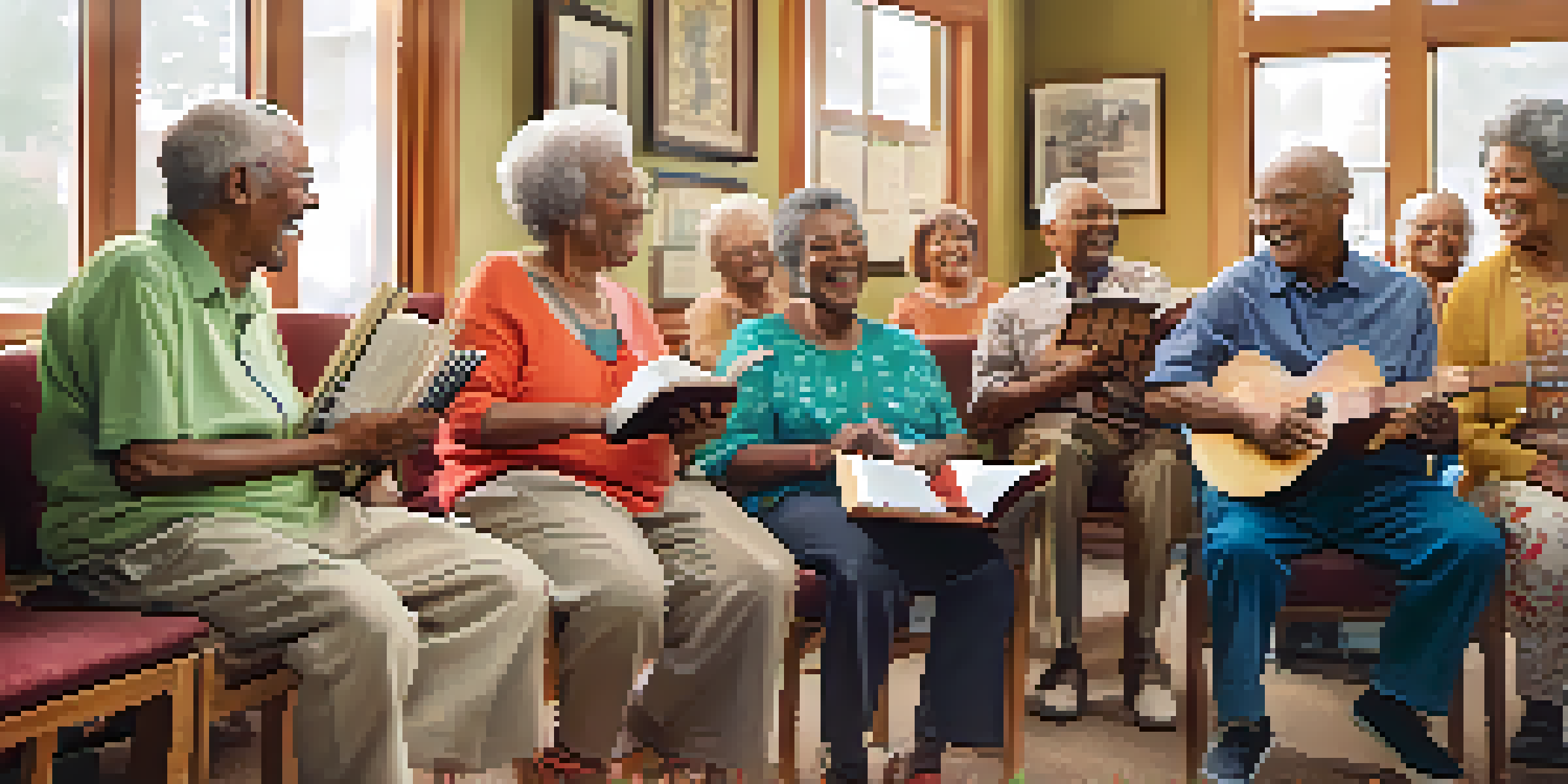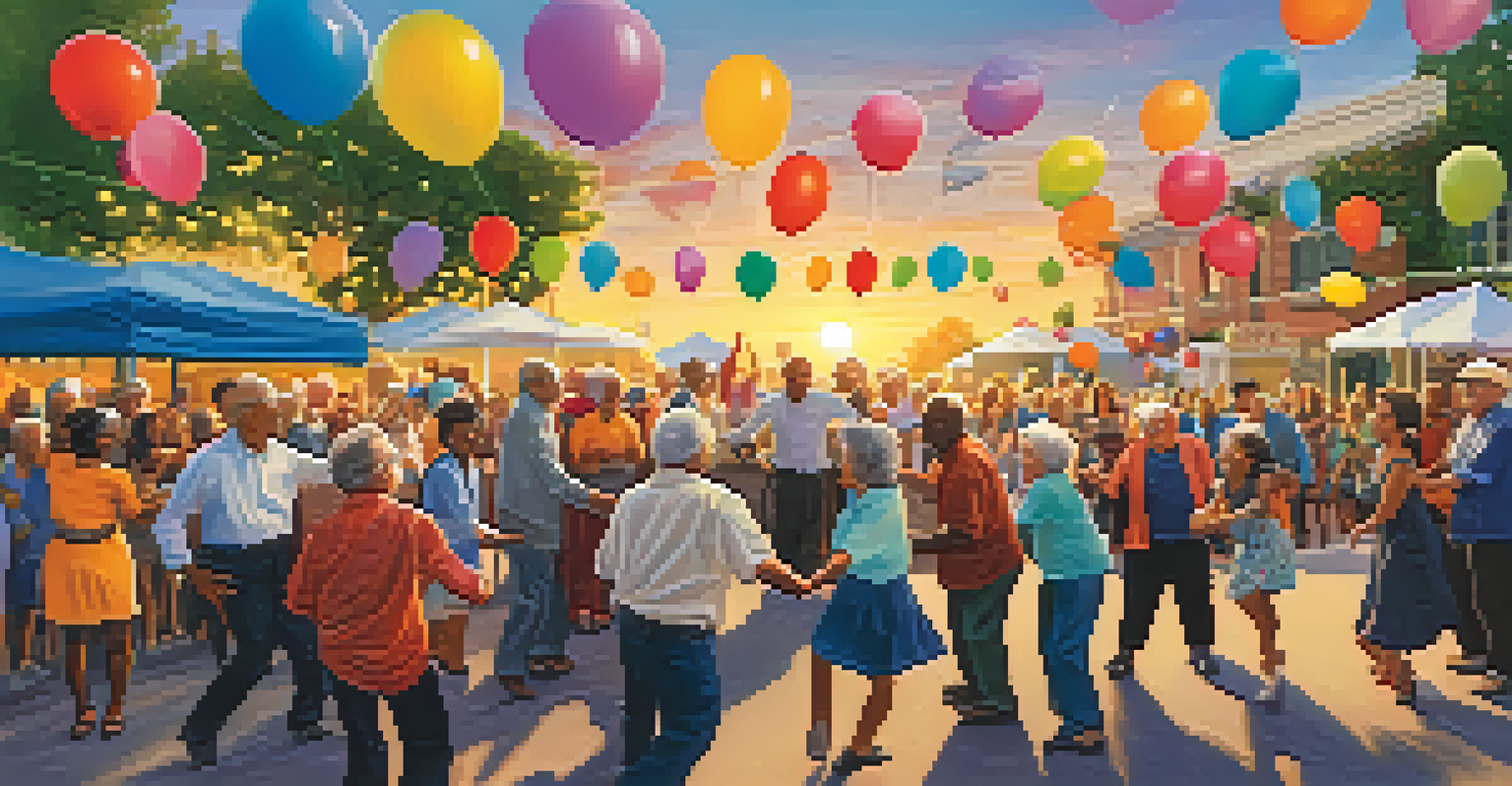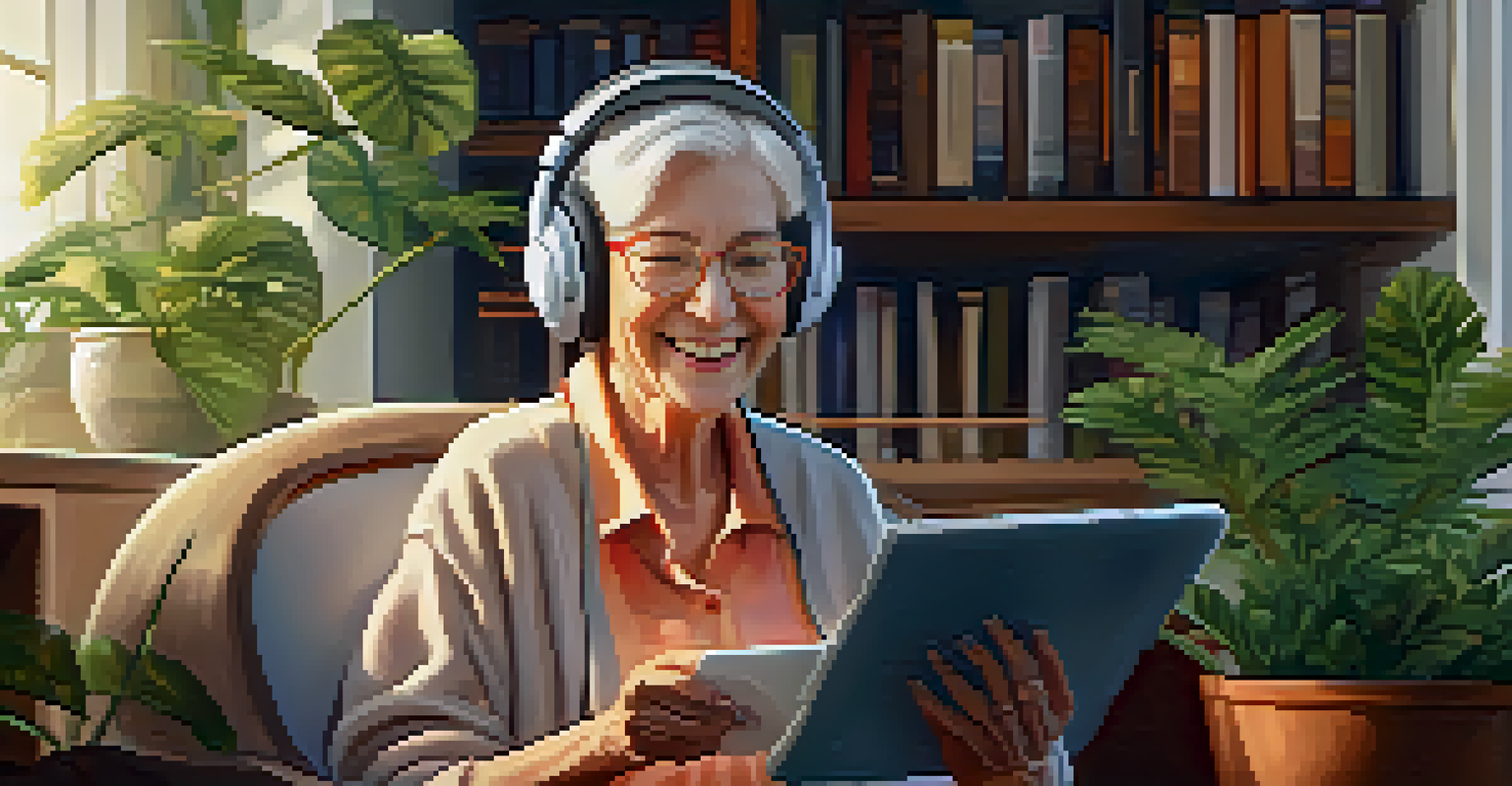Music as a Tool for Enhancing Social Connections in Seniors

The Power of Music in Building Connections
Music has a unique ability to bring people together, transcending barriers of age and background. For seniors, it can be a powerful tool to foster social connections, combat loneliness, and create shared experiences. Whether it's through singing, dancing, or simply enjoying tunes together, the communal aspect of music can enhance relationships and strengthen bonds among peers.
Music can change the world because it can change people.
In group settings, music encourages interaction and collaboration, making it easier for seniors to engage with one another. This social engagement is vital as it can lead to lasting friendships and a sense of belonging. When seniors participate in music-related activities, they often find common ground, sparking conversations that might not occur otherwise.
Moreover, music can evoke memories and emotions, providing a natural conversation starter. As seniors reminisce about songs from their past, they share stories and experiences that further deepen their connections with others. This shared nostalgia can create a warm, inviting atmosphere that cultivates social ties.
Music Therapy: A Tool for Connection and Healing
Music therapy is an increasingly popular method used to enhance emotional and social well-being among seniors. Certified music therapists use tailored interventions to promote social interaction, improve mood, and even aid cognitive function. By participating in group sessions, seniors can connect with one another while engaging in a therapeutic process that benefits their overall health.

These sessions often include singing, songwriting, or playing instruments, which naturally encourages collaboration and teamwork. As seniors work together on musical projects, they share not only their talents but also their emotions and life stories. This collaborative spirit fosters a sense of community that is essential for maintaining mental and emotional health.
Music Builds Social Connections
Music fosters social engagement among seniors, helping them combat loneliness and form lasting friendships through shared experiences.
In addition, music therapy can help address specific challenges faced by seniors, such as memory loss or depression. By providing a safe space to express feelings through music, seniors can connect with their peers on a deeper level. The joy of creating and sharing music can be incredibly empowering, reinforcing their social bonds.
Group Activities: Singing and Dancing Together
Participating in group music activities, like singing in a choir or dancing in a class, can be incredibly beneficial for seniors. These shared experiences encourage laughter and camaraderie, helping to dispel feelings of isolation. When seniors gather to sing or dance, they create a lively atmosphere filled with joy and connection.
Where words fail, music speaks.
Moreover, group activities can be tailored to accommodate varying levels of mobility and musical ability, ensuring everyone can participate. Whether it’s a simple sing-along or a more structured dance routine, the key is inclusivity. This sense of belonging can significantly uplift seniors’ spirits and foster meaningful relationships.
Additionally, the physical benefits of dancing or even clapping along to music cannot be overlooked. Regular movement can improve mobility and coordination, while the social aspect promotes interactions that might not occur in more sedentary settings. In this way, music not only enhances social connections but also contributes to physical well-being.
Creating Music-based Community Events
Community events centered around music can be a fantastic way to bring seniors together. From local concerts to open mic nights, these events provide opportunities for social interaction while enjoying live performances. Attending such gatherings can help seniors feel more engaged with their community and create bonds with fellow attendees.
Moreover, organizing music-themed events, like talent shows or karaoke nights, can empower seniors to showcase their talents and share their love of music. These platforms allow them to shine and connect with others who share similar interests, boosting their confidence and sense of belonging. It’s a win-win situation that enriches the community as a whole.
Therapeutic Benefits of Music
Music therapy enhances emotional well-being, promotes collaboration, and addresses specific challenges faced by seniors.
Additionally, such events often attract a diverse audience, which can help bridge generational gaps. When younger community members join seniors for a night of music, they create intergenerational connections that benefit everyone involved. This cross-generational engagement fosters understanding and appreciation for different musical tastes and experiences.
Music and Memory: A Journey Through Time
Music has a remarkable ability to trigger memories, often transporting seniors back to significant moments in their lives. This phenomenon can be particularly beneficial in settings like assisted living facilities, where residents may be struggling with memory loss. Familiar songs can spark conversations and help seniors reconnect with their past, fostering social interactions.
When seniors share memories associated with specific songs, they often find common ground with others who have similar experiences. This shared nostalgia can create a strong bond, as they reminisce about their youth, family gatherings, or special occasions. These conversations can be heartwarming and serve as a bridge to deeper friendships.
Moreover, engaging with music can provide comfort and joy, improving overall well-being. Creating playlists of favorite songs or setting up music-sharing sessions can enhance the quality of life for seniors, ensuring that they feel valued and connected. Ultimately, the memories stirred by music can become a powerful tool for social connection.
The Role of Technology in Music Connection
In today’s digital age, technology plays a significant role in how seniors access and enjoy music. Streaming services, music apps, and social media platforms provide countless opportunities for seniors to discover new songs and share their musical experiences. Technology can bridge the gap, allowing them to connect with family and friends through shared playlists and virtual concerts.
For instance, families can create collaborative playlists to share with their loved ones, encouraging conversations about favorite songs and memories. Additionally, virtual singing groups can connect seniors from different locations, ensuring that geography doesn’t hinder their ability to socialize through music. This adaptability is especially important for those with mobility challenges or living far from their peers.
Technology Enhances Musical Access
Digital platforms allow seniors to discover new music, connect with loved ones, and participate in virtual music activities, enriching their social lives.
Furthermore, technology opens up avenues for seniors to explore diverse musical genres and cultures. By broadening their musical horizons, they can connect with others who share similar interests or introduce their peers to new styles. This exploration can lead to exciting discussions and new friendships, enriching their social lives.
Conclusion: Embracing Music for Social Well-being
In conclusion, music serves as a powerful tool for enhancing social connections among seniors. From engaging in group activities to utilizing technology, there are countless ways to incorporate music into their daily lives. The emotional and physical benefits of music foster a sense of community and belonging, which is crucial for overall well-being.
Encouraging seniors to participate in music-related activities can lead to deeper connections and improved mental health. Whether through singing, dancing, or simply enjoying music together, these experiences can create lasting memories and friendships. The joy of music can lift spirits and create a vibrant social environment.

As we continue to explore the myriad ways music can enrich our lives, let’s embrace its potential to bring seniors together. By fostering an inclusive environment where music thrives, we can help build a supportive community that celebrates the power of connection through melody.